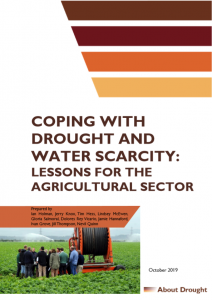Translating academic research for policy-makers
“About Drought has brought policy-makers, scientists and academics together and that is becoming more important because the complexities and uncertainties in the science are fundamental to making the best policy decisions, especially with climate change playing an increasing role”
Trevor Bishop, Director, Water Resources South East & MD of H2Outcomes
The person in the driving seat of the UK’s response to the 2012 drought was Trevor Bishop, then Deputy Director of Water Resources at the Environment Agency and Ofwat’s Director for Strategy & Planning during the 2018 hot dry summer of peak demand.
With a water crisis looming in 2012, he was appointed to co-ordinate the first multi sector cross cutting National Drought Group, reporting directly to the Government, and bringing together companies, regulators and government departments, representatives of agriculture and power groups and chaired by the Secretary of State for the Environment, Food and Rural Affairs, Caroline Spelman.
Trevor recalls: “In a worst-case scenario we were within 160 days of running out of water for some parts of London, with the 2012 Olympics on the horizon, 20 million people were on water restrictions and so were several thousand businesses for which water was critical.”
2012 drought triggered investment in research
Many parts of England had experienced the driest 18 months for more than 100 years and the crisis triggered the Research Councils’ £12m investment in the UK’s Drought & Water Scarcity Research Programme and several projects, now collectively known as About Drought.
He says: “About Drought is helping us to understand what the evidence is really saying so people like me can get behind the science. The events About Drought has held are the best I have seen at doing that.”
One of the most complex messages to translate from academia to policy and decision-makers is uncertainty. As a scientist by background, Trevor says: “Uncertainty is absolutely key, confidence in evidence data and About Drought’s better and more timely presentation of data is helping decision-makers to better manage uncertainty.
Trusted relationships for scientists and decision-makers
“The people making key decisions in a water crisis are generally not scientists and they may not always understand some of the subtleties behind academic report headlines. There are so many different layers in pure science, and decision-makers are always at risk of mis-representing some of the science.”
The solution is to build trusted, working relationships between policy-makers and the scientists behind the research, Trevor believes, involving more scientists in policy-making, working closely with universities and research organisations and maintaining that network beyond the life of the About Drought programme.
He explains: “Academics tend to operate in a semi-closed community but About Drought has brought policy-makers, scientists and academics together and that is becoming more and more important because the complexities and uncertainties in the science are fundamental to making the best policy decisions, especially with climate change playing an increasing role.”
Reliable data, meaningful and effective tools
The benefits of the relationships and community created by About Drought were felt in last summer’s dry spell. Trevor credits the MaRIUS project, in particular, with providing reliable data through meaningful and effective tools, such as the National Water Resources Model (WATHNET).
He says: “The models of drought we had were already starting to not perform as well as they used to because we are already seeing the subtle shifts that are taking place due to climate change, so we can’t rely on past data so much. But About Drought helped us and it was really good last summer to see key policy-makers and decision-makers thinking big and acting early.
“At least once a year we should bring this community we have formed together again – the policy-makers, the top scientists and academics – because that link needs to be rock solid.”
Interview by Sally Stevens
Posted October 2019

